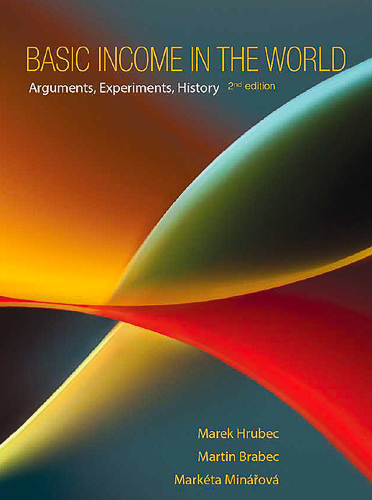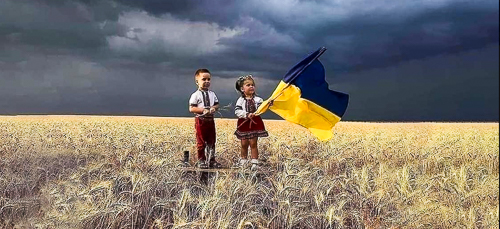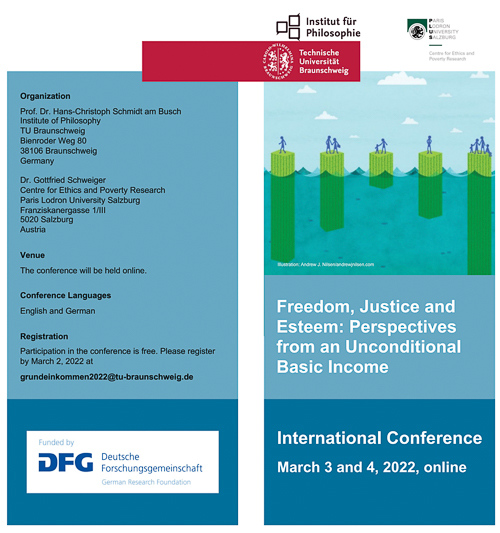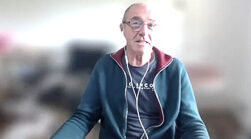
by Peter Knight | Sep 14, 2022 | News
This book — written by Marek Hrubec, Martin Brabec, and Marketa Minarova — “offers an introduction to the important idea and practice of unconditional basic income, which is becoming a topic increasingly discussed not only among researchers but also among citizens and the politicians who represent them. The topic is also increasingly making its way into the mass media….. This book discusses basic income by presenting the main arguments and experiments with basic income in Europe, the Americas, Africa, and Asia. Basic income offers the possibility of a major social and civilizational change for all.”
For details from the publisher, click here.

by Greg Marston | Jul 26, 2022 | Events, News
The annual Basic Income Earth Network (BIEN) Congress comes to Australia in 2022. Brisbane will host the three-day conference between September 26 and September 28 in a hybrid face-to-face and online format. Registration is now open https://www.bien2022.com/registration.
BIEN2022’s headline theme of Crisis & Transformation invites Congress participants to interrogate the role the basic income in addressing the major ecological, health and economic crises besetting our world today. This task could not be more urgent.
Australia is among the many countries to have experienced catastrophic wildfires and floods in recent years. At the same time, the COVID-19 pandemic ripped through society, while economic inequality and insecurity continued to grow. An estimated 1 billion animals were killed in Australia’s 2019 bushfires, while some East Coast homes have been inundated three times in 12 months in recent floods. Natural disasters and the pandemic forced national and state governments to introduce radical policy interventions, including in the area of income support. These interventions proved temporary. But could they hold important lessons for basic income researchers and advocates?
BIEN2022 comprises over 200 papers, panels and roundtables presented by leading thinkers, researchers, policymakers and activists from around the world. Highlights include: a video message from Andrew Yang, Kathi Weeks on Work Futures & Post-Productivism, Guy Standing on The Blue Commons, Philippe van Parijs on Climate on Covid, Putin: Dawn or dusk for UBI?, and contributions from leading activists and artists in the basic income movement, including Scott Santens and Jessie Golem. Experts from the World Bank, International Labour Organisation, CEPAL and ODI will examine the potential of Emergency Basic Income in light of the of the pandemic experience. Other speakers include, Annie Miller, Almaz Zelleke, Yanu Prasetyo, Sarath Davala, Ugo Gentilini, Hyosang Ahn, Hilde Latour, Karl Widerquist, Toru Yamamori, Louise Haagh, Neil Howard and many more. BIEN2022 includes sessions on basic income and health, analysis of experiments in South Korea, Brazil, North America and Europe and film screenings.
For those traveling to Brisbane, location and accommodation information is available at https://www.bien2022.com/location.
To register for BIEN2022, please visit https://www.bien2022.com/registration.
For Congress updates follow us at https://twitter.com/bien2022.

by Guest Contributor | Apr 21, 2022 | Opinion
The idea of Basic Income is catching on around the world as it is getting more and more support, especially after cash payments many countries paid during the Covid-19 pandemic and Russia’s so-called “special military operation” in Ukraine.
A Basic Income is a periodic cash payment unconditionally delivered to all on an individual basis, without a means-test or work requirement. This is the first phrase you can see when you open BIEN’s website. So where should states get money for it? For example, from natural resources, as Alaska Permanent Fund does, and from taxes including a tax on robots, carbon tax, as well as a tax on cryptocurrencies, etc. The view that the state should supplement the income of the poor has a long history. For example, one way to increase the incomes of the poor proposed by Milton Friedman is a negative income tax. The idea is quite simple: richer people pay taxes and poorer ones get some percentage of this.
Ukrainians receive financial aid in the amount of 6500 hryvnias (just over US$200) under the program “ePidtrymka” for loss of part of wages (income), work (economic activity), which are temporarily stopped because of military actions during the current military struggle in Ukraine. It’s just a one-time payment with several strict conditions, including a territorial one. The deadline for submitting applications was March 31, 2022. So, what should other people do after April 1? Why shouldn’t children, women, single parents, young people, the disabled, and the unemployed be taken care of? Every Ukrainian needs to be paid because of the economic collapse and losses of income.
But is $200 enough to help someone who lost a family, home, or job? Is $200 enough to help anyone start life over in Europe or in an almost destroyed country? If this person is gravely ill? What about mental health, which was destroyed, of children, women, and youth? Every Ukrainian needs to be paid at least 500 Euros every month at best for the war’s duration until normal life is fully restored. I believe these brave people deserve more! Ukrainian people should be rewarded with UBI forever. This will be the greatest social experiment in history as well as a clear example for other countries and peoples.
Not only thousands of Ukrainians but also thousands of Russians are dying because of the actions of the Russian authorities. Let’s remember the dramatic events in Bucha, Ukraine, and in other cities. The Ukrainian government suspects soldiers from Khabarovsk, Buryatia, the Far East, and others of committing crimes. These are depressed regions with low incomes and high unemployment, despite their vast territories and natural resources. Residents have little choice: either to serve in the army and security services or to migrate to richer regions of the country. So, these hungry soldiers saw that people in Bucha were living their normal comfortable life. Maybe that’s why they were so cruel? Of course, it’s hard for me to reflect on why they acted like animals. But I strongly believe that they wouldn’t invade another country if they were receiving a basic income.
The situation is similar in other Russian regions like Tuva, Ingushetia, Kabardino-Balkaria Republic, Altai, Jewish Autonomous Region. That doesn’t mean that in other regions the situation is better. Maybe just a little. Official statistics (according to the “new methodology”) indicate that there were more than 16 million people below the poverty line at the end of 2021 in Russia. According to the old methodology, there were more than 20 million people in need. Official Russian statistics are underestimated by two to three times, according to the experts. Anyway, what will happen to Russians after the war and devastating economic sanctions? Of course, I’m not making a comparison between “lost a job” and “lost a life”. However, in my opinion, very few people would participate in an unjust war if they had a basic income and a stable and prosperous life. Therefore, Russians also need a basic income. People would be critical of the propaganda if they have more opportunities.
Ukraine is a brave country that is fighting against Russia’s military intervention and is protecting the entire world from danger. Of course, the other countries support Ukraine. Ukrainians need to be paid basic income. I may repeat it forever. Basic Income has the potential to eliminate the need for war, and that’s why it is important to raise awareness of what Basic Income can do. Ukrainians need to live their calm normal life instead of hiding in their basements as they do right now. Millions of people were forced to flee Ukraine, many had to bury their children or parents in the yards. Nobody knows their feelings. I hope that nobody will ever do that again.
The war has affected the entire global community. Does the world forget the Chernobyl accident in 1986? Doesn’t the world read or hear about Russian soldiers in the Chernobyl nuclear power plant? Quoting a CNN report, “Although Chernobyl is not an active power plant, the sarcophagus above the reactor that exploded nearly 36 years ago needs to be maintained to avoid further radiation leaks. There is also a considerable amount of spent nuclear fuel that needs to be looked after”.
These miserable soldiers were ordered to dig trenches in that area, which is particularly radioactive. This zone right now is under the control of Ukrainian soldiers, but Russian soldiers may come back. This may be a bigger ecological problem than CO2 emissions for the whole world. What about the threat of Russian use of tactical nuclear weapons? Why do people worry about CO2 while so many people keep dying right now: young, old, children, men, and women? What could happen to the world after nuclear weapons are used?
Ukraine is a strong country. We are proud as well as terribly sorry about all the events that happen there. Crying and praying for it to end soon, to stop people’s unfair death. This is the whole world’s inexcusable mistake. We could have avoided so many deaths if a Basic Income had been introduced to the world. UBI will reduce humanity’s aggression and destroy the economic, political, and psychological causes of war.
Instability in the world is increasing. Food, gasoline, gas, and service prices are increasing all over the world, including in Africa and Asia. I know that heating prices are high right now in Europe. Soon it will be summer, but later fall and winter will come. The whole planet suffers from Russian military action in the center of Europe and is terrified at the thought of a world nuclear war. We should think about basic income today. No, that’s not right. We should have thought about it yesterday before these disasters. The 99% shouldn’t suffer from the decisions of the 1%. People need to be more independent from the government.
Article by: Irina Soloveva, Jr.

by Peter Knight | Feb 23, 2022 | Events, News
Unconditional basic income continues to be a subject of lively debate – both in academia and in the public and political spheres. From a philosophical and social science perspective, the questions it raises are: Would such an income increase our individual freedom? What impact would it have on fundamental forms of social esteem? And could it be consistent with notions of justice based on reciprocity? These systematic questions will be discussed at the conference, taking into account relevant historical and theoretical developments.
Conference website: https://www.tu-braunschweig.de/en/philosophie/basic-income
Conference Languages: English and German
Venue: The conference will be held online. Links will be sent after registration.
Registration: Participation in the conference is free. Please register by March 2, 2022 at
grundeinkommen2022@tu-braunschweig.de
Program:
March 3, 2022 (all times are CET – UTC+1)
11–11.30 Hans-Christoph Schmidt am Busch, Gottfried Schweiger: Welcome
11.30 –12.40 Matilde Cazzola (Frankfurt am Main): Beyond Poverty and the Coercion of Work: Thomas Spence and the Redistribution of Quarterly Dividends
2–3.10 Silke Bothfeld (Bremen): Eignet sich ein bedingungsloses Grundeinkommen für die nachhaltige Förderung individueller Autonomie? Ein Kommentar aus der Perspektive der Sozialpolitikforschung
3.30–4.40 Jürgen Schupp (Berlin): Das 2021 gestartete Pilotprojekt Grundeinkommen in Deutschland: Zum Stellenwert sozialwissenschaftlicher Feldexperimente
5–6 Philippe Van Parijs (Louvain): Prospects and Challenges for an Unconditional Basic Income: A Conversation with Philippe Van Parijs
March 4, 2022
9.30–10.40 Malcom Torry (London): Basic Income: A Brief History of the Idea
10.50–12 Peter Sloman (Cambridge): Redistribution or Revolution? Basic Income and Radical Politics in Britain, c. 1918-1950
1–2.10 Olavi Kangas (Turku): Possibilities to Plan and Implement Large Scale Social Experiments – Some Lessons from the Finnish Basic Income Experiment
2.10–3 Hans-Christoph Schmidt am Busch, Gottfried Schweiger: Final Discussion and Farewell

by Peter Knight | Jan 28, 2022 | Events, News
Enno Schmidt, Götz Werner Chair (GWP) of Economic Policy and Constitutional Economic Theory at Germany’s University of Frieburg, interviewed Karl Widerquist, Professor of Philosophy at Georgetown University-Qatar, in October 2021. You can view the interview on YouTube here.
The interview covers a wide range of basic income topics, including the pros and cons of basic income experiments, options for funding basic income, and the ups and downs of public interest in basic income since the 1970s.






